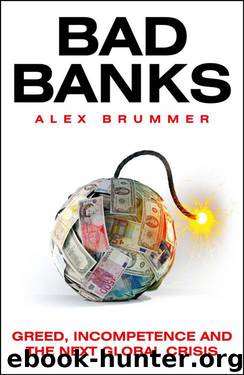Bad Banks: Greed, Incompetence and the Next Global Crisis by Brummer Alex

Author:Brummer, Alex [Brummer, Alex]
Language: eng
Format: epub
ISBN: 9781448183319
Publisher: Random House
Published: 2014-07-16T23:00:00+00:00
7
The Perils of Global Banking: Money Laundering
Among Britain’s swaggering breed of pre-crisis bankers Stephen Green, the chairman and chief executive of Britain’s biggest bank HSBC, always seemed a little different. Fiercely intellectual, somewhat diffident, he exuded a sense of high moral standards in a profession all too often besmirched by greed, wrongdoing and a disregard for the well-being of customers. As one might expect for a man in his position he had followed a fairly typical career course, serving first at consultants McKinsey before moving onto the old Hongkong and Shanghai Banking Corporation in 1982. But he had also been ordained as an Anglican priest, and was rather proud of the fact that he was the first practising banker ever to have the privilege of preaching at St Paul’s Cathedral, in the heart of the City of London.
When I interviewed him in 2009, at the time of the publication of his second book Good Value – a moral defence of capitalism that was nominated for the prestigious Goldman Sachs/FT Business Book of the Year prize – he expressed disgust for the worst excesses of his fellow bankers. Green evoked that oldest of City aphorisms ‘our word is our bond’, adding, ‘The idea that you can play fast and loose with that is immoral.’
I left Green’s spacious office in the HSBC tower at Canary Wharf feeling that he and his bank were different. True, HSBC had been caught up in the sub-prime debacle through its November 2002 purchase of US Household Finance Corporation, the ‘trailer-park’ lender that made mortgage, car and credit-card loans to sub-prime borrowers. But this deal had been the brainchild of Green’s predecessor Sir John Bond and the new chairman was acting to clean things up. Consequently, when in December 2010 Green was selected by Prime Minister David Cameron to be the UK’s new trade minister and was elevated to the House of Lords as Baron Green of Hurstpierpoint, it looked a good appointment. Green brought expertise and moral authority to the role. Thanks to his HSBC background, he also had the reputation, knowledge and influence to make a real impact on Britain’s weak trade relations with China and the other fast-growing emerging democracies of Asia. This, after all, was HSBC territory.
HSBC always did seem a steadier, better balanced and more carefully controlled bank than many of its compatriots on Britain’s high streets. To that extent its exposure to the fallout from its $15.5 billion acquisition of Household seemed a blip, albeit a large one: the unit would lose a staggering $50 billion over six years before in was closed in 2009. It is testimony to the strength of the rest of the HSBC operations, from its British branch-banking network (the former Midland Bank) to its domination of Hong Kong’s booming markets, that it could survive such losses with barely a tremor. As a result, HSBC never came under the sustained pressure that threatened the survival of the Royal Bank of Scotland (RBS), Lloyds Banking Group and to lesser extent Barclays.
Download
This site does not store any files on its server. We only index and link to content provided by other sites. Please contact the content providers to delete copyright contents if any and email us, we'll remove relevant links or contents immediately.
International Integration of the Brazilian Economy by Elias C. Grivoyannis(111059)
The Radium Girls by Kate Moore(12028)
Turbulence by E. J. Noyes(8049)
Nudge - Improving Decisions about Health, Wealth, and Happiness by Thaler Sunstein(7707)
The Black Swan by Nassim Nicholas Taleb(7129)
Rich Dad Poor Dad by Robert T. Kiyosaki(6632)
Pioneering Portfolio Management by David F. Swensen(6301)
Man-made Catastrophes and Risk Information Concealment by Dmitry Chernov & Didier Sornette(6019)
Zero to One by Peter Thiel(5802)
Secrecy World by Jake Bernstein(4753)
Millionaire: The Philanderer, Gambler, and Duelist Who Invented Modern Finance by Janet Gleeson(4478)
The Age of Surveillance Capitalism by Shoshana Zuboff(4292)
Skin in the Game by Nassim Nicholas Taleb(4248)
The Money Culture by Michael Lewis(4207)
Bullshit Jobs by David Graeber(4190)
Skin in the Game: Hidden Asymmetries in Daily Life by Nassim Nicholas Taleb(4007)
The Dhandho Investor by Mohnish Pabrai(3765)
The Wisdom of Finance by Mihir Desai(3747)
Blockchain Basics by Daniel Drescher(3583)
